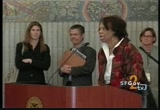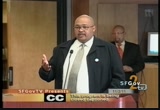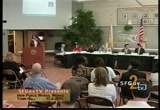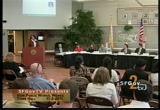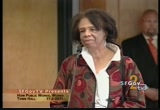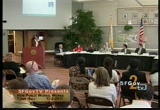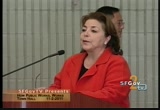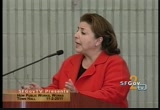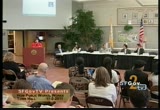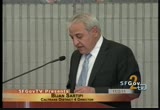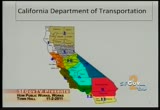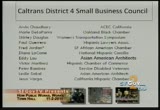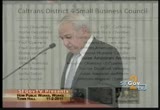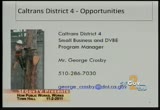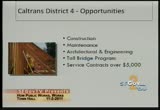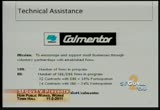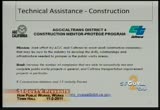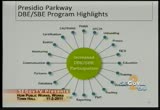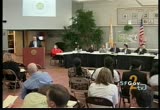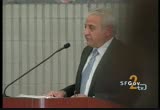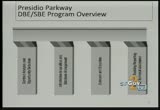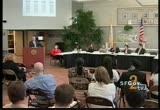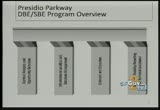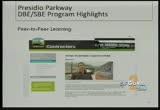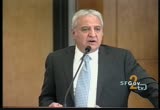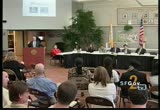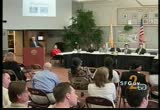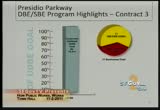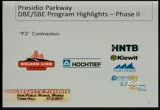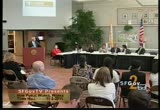tv [untitled] September 7, 2012 10:00pm-10:30pm PDT
10:00 pm
we do have with us this afternoon mohammed nuru, director of d.p.w. mohammed, where are you? [applause] mohammed is going to have to rush out, but he wants to say welcome and thank you. >> good afternoon, everyone. and thank you for inviting the department of public works over here to talk about our contract processes. we are part of the city family and he will not be able to stay for the whole event, but edgar lopez, who is from our department, who actually is involved in many of the
10:01 pm
projects, the new public safety building, most of the projects in san francisco are actually under his leadership. so he can talk in detail about how they meet many of the goals and what we have coming out. we do have quite a number of projects that are coming out. all those new projects are subject to the 30% local resident hiring. you will see from the information that our department has far exceeded many of those goals that have been sent. we actually track everything and i think the exciting part is that we do have a number of projects that are coming online, and so this hope for work. as it relates to purchasing and buying equipment and rental equipment, which many of you are very familiar with, we've also
10:02 pm
far exceeded the goals that have been set for us. so we have all that information. you're in good hands. and thank you for allowing us to participate in this forum. it's a great forum. and please just work with us and ask us questions and we'll do our best. so thank you. [applause] >> thank you, mohammed. director nuru, we have worked many years together. some of you already know him from our neighborhood and what he does. what he's done in the neighborhood, he will continue to do at the department of public works. he will make sure that his commitment to the residents and to the public is just the same as he has done with cleaning the neighborhood and keeping our city clean. mohammed is one of the most dedicated, committed civil
10:03 pm
servants. so i want to thank him for being able to pop in just a little bit. something came up. he had to rush off to take care of an emergency. our next part of the program will be my commissioner. here comes supervisor cohen. i'm going to give her a chance to come in and put her bags down. i would like for the commissioner to come up and talk a little bit about our guest speaker today. i'll just say something briefly. i met him almost two years ago. and he's absolutely one of the most supportive advocates our community could have. he provided for us to have a training program two years ago, c.m. construction management testing and inspection training program. we had 21 residents from san francisco to participate in that
10:04 pm
program. the program ran for eight weeks, for eight hours a day. that's a big commitment getting up and being there at 8:00 on a saturday. i was a chaperon. i know, i'm still tired from that. the kids are exited and quite involved with the classroom. we had the bay bridge inspector, one of the big highlights of the training program. he talked about the white stripes you see on the streets. the kids were just amazed he had invented that. he had a lot of patents and he brought all his props. they really enjoyed that. out of the training program, each -- once they completed the training program and they graduated, they received a cal tran certificate of training for c.m. construction, which have allowed them to work on public
10:05 pm
works jobs. we want to be able to do that again in partnership with call tran and we're looking forward to that cooperation in the future. but again, we were able to place quite a few of the trainees, and i understand from just hearing from them from time to time they're doing quite well. they're still on the job and doing a great service. so i'm going to bring the human rights commissioner up and she's going to give us a little bit. [applause] >> good afternoon. thank you for coming. this is a great, great crowd. thank you so much for taking the time to come here. i have a very easy job this afternoon. i have to introduce an
10:06 pm
incredible department head. jan has been with the california transportation agency for the past 27 years serving as engineer and very high-profile management position. at this capacity, he is responsible for the day-to-day operation of state highway for nine counties in the bay area. that's a huge responsibility. he is managing 7,600 lanes of high waist. he's responsible for employees with the operation budget of $550 million. and you have to pay attention to
10:07 pm
this part. $4.1 billion of contracts. that is a huge job and he has been doing an amazing job. with that huge responsibility, he still finds the time to go to town hall meetings and the community meetings, meet with everybody, and talk about what he's doing and also help with them, work with them to understand the whole process. he has been involved in design and improvement of major projects such as i-80, u.s. 101 auxiliary lanes, the central freeway, the san francisco international airport expansion project ramps and roadway improvement. i'm sure all of us, when we go to airports, you basically send a thank you for making it very easy for everybody to get in and out.
10:08 pm
and as you recall, many years ago before the improvement, there was a tremendous bottleneck, and what he has done, he has made it really easy for disability concerns. in addition to the tremendous responsibility he has as a district four director, he's also serving as a commissioner on the metropolitan transportation commission. she also served as ex-official member of the joint power authority. it's truly an honor to have him here as our guest speaker, and please join me to welcome him to the podium. [applause] >> good afternoon. thank you for that introduction.
10:09 pm
it is really an honor for me to be here with you today. i want to thank the supervisor for having this town hall meeting put together and thank all of the city agencies who are participating in this. i want to thank zola jones, who found me and let me know that this event was going on. and sent me an e-mail. it's been two years since we last met and it's good to see you again. these days -- we've got a short power point presentation that i'm going to be using. just talk about some of the things we'll be doing, what our agency is about, the type of work that we do. and as you all know, cal trans covers the entire state of california.
10:10 pm
and in order to better manage that, we have broken down the department into 12 districts just like the city has different districts. that helps us in being closer to the community. helps us in increasing the utilization of the small businesses, disadvantage businesses and disabled enterprise businesses. the department manages 50,000 lane miles of highway, 22,000 employees statewide. my operation here in district 4, it covers the nine bay area counties. as you can see in the map. which is about 7,000 lane miles of highway. we have the toll bridges that we operate. we have just under 4,000 employees. our budgets, our capital program ongoing at the present time with 155 contracts, it's about 4.6 billion. so there's a lot of work that is going on, and a lot of that is
10:11 pm
due to the toll bridge program. half of that is the repair of the various toll bridges that we have, and of course the biggest project, one of the largest public works projects in the nation is the span of the bay bridge that we're working on. in the district, we work with all of the 101 cities, with all of the nine counties that covers the bay area, with seven self-help counties, including the san francisco county transportation authority. we work with the 26-plus transit agencies that are in the region and with the condition management agencies. it is a dynamic region. there's a lot of needs in the area. and one of the ways that we do try to incorporate and enhance the utilization of a small business is on a small business
10:12 pm
council, which is a council comprised of the association of the california engineering companies, african-american chamber of commerce, the hispanic chamber of commerce, the mexican contractors, and the list goes on and on. we meet on a regular basis and they advise me on ways of increasing utilization of the small businesses, disadvantaged businesses, and disadvantaged -- disabled veterans enterprise businesses. as you can see, if you can look at our statewide small business council, which covers the entire estate, a number of our council members are actually included in this statewide, including fred jordan, which i'm sure most of you know. he is a good friend. he's certainly the most recognized figure in the state advocating for increased
10:13 pm
participation of underrepresented and disadvantaged businesses, and we are grateful and lucky to have him committed to our council. with the state of the state and the state of our nation and the fiscal condition, we're all asked to do more with less. we're all asked to do -- with less employees, with less resources. one of the employees that you should know, which is -- i put the contact information there, is my liaison for our small business program, george crosby. his phone number and e-mail address is there. he is working with his team to make sure that we do our outreaches correctly, that we're connecting the small contractors with the larger firms, both in the construction side and also in the architectural engineering
10:14 pm
side. so george is a key person that you certainly want to have his number and his contact information. and he works very closely with all of the divisions that we have in the district, be it our construction, our maintenance, and our architectural engineering division, to make sure that in any contracting that we do, and we do a lot of contracts, not just construction contracts, but we do a lot of purchases. we have outreaches and we have workshop for purchases. he makes sure that we are making connection with the community and we're making connection with the small businesses and making sure that the small business knows and is aware of all the opportunities that are out there, and then it is upon the small business to make sure that they do make the contact, that they do show up in the purchasing events that we have and participate -- either bid on
10:15 pm
contracts or participate in the various procurements that we do for all the activities that goes on in the district. in order to increase utilization of the a&e contract for small businesses, we have put together what we call a mentor. we have over 100 participants in that program. and what they do is they take the small businesses under their arm, show them how the business operation works, not just the technical aspects of things, but how to do presentations, how to prepare it. documents that are presented for bidding purposes. and basically teaching them how to get the public works contract and specifically for cal trans, but in general, any public works contract. as you can see, our utilization
10:16 pm
of both small business and d.b.e. exceeds our goals. 38% is a very respectable number given that our goal for federal disadvantage business is 13.5%, and ours a pir ration and goal for business is 25%, and you can see that we're reaching to 34% in that goal also. if you have another mentor protege program which is focused in construction. these are prime contractors that work with the small firms, small contractors. again, they will sign an agreement. at times, the same small businesses outbid the prime that mentored them. we've had a number of examples of those. it's a very robust program that we have with the association of general contractors.
10:17 pm
we've signed an agreement with them and we do have the numbers there. eight construction companies and mentors that are participating in that program. it's a very good program and i'm thankful to a.g.c. for working with us and participating in that aspect of our work. >> as i mentioned, and as was mentioned earlier, we cover not just the san francisco county, but the entire nine counties of bay area, and we cover a lot of projects in our region. 155 contracts,. but any contracting that we do, this chart shows the type of work that we do to make sure that we're providing access to those contracts. we have a number of partners. a lot of money comes from the feds to us that supports our entire capital program. and we make sure that we do
10:18 pm
training. we make sure that we do outreach. we make sure that we are monitoring our contracts and we are gathering information about availability redo have databases that we have set up. one of our great partners here is paul penkergass, who is a local business in san francisco. they work on one of the major projects in the city and county of san francisco, the park drive, access to the golden gate bridge. phase one, which is under way right now toward completion, is one that has taken the attention of a number of
10:19 pm
leaders, national leaders. congresswoman, nancy pelosi, speaker of the house, brought tremendous support to the project and participated in a number of ground-breakings that we had. dick menendes, the director of the federal highway administration, supported the project and provided us with a number of dollars that actually made the entire funding package work. that project is under way. other locals who help us, the executive director of the san francisco transportation authority, supervisor mirkarimi participated in a number of our events and has always been supportive in the city leadership. the mayor has provided us with
10:20 pm
his support of the activitying that we do -- of the acts that we do, and senator leno has his eye and support for small businesses and recognized one of our programs and one of our small businesses who works on the doyle drive construction contract. during one of our ground-breakings, we were lucky to have julie berry, who is also present here, who does concrete work. cam-con is the small businesses she operates. she came to us with three employees after she did get a contract. i believe she has raised up to 10, and she has brought at least one, maybe more, concrete pump trucks. six now.
10:21 pm
well, that is even better. so we have good examples of those who really want the contract, work at it. we provide the opportunity, and the rest of it is with those who have the skills to come forward. as i mentioned, paul, julie, and michael sitting next to julie, is also part of the business that is run. julie was -- and her company, was actually featured on the white house website and the federal highways d.o.t. site for a number of weeks because of work she did. she played a trip to virginia, and the federal highway was looking at the program that our small business and disadvantaged business had put together as an example of how the out reaches should be done and how we can make these works
10:22 pm
available to everyone who is willing to participate. this chart, which is put together, paul has been working with us very closely. there are a number of elements that have to be in place for us to make sure that we understand what opportunities are available. we monitor what is out there in construction and what we are actually performing. to do all of that, to make sure that we do make the connection between the larger prime contractors and the smaller firms either on tasks, trucking and providing supplies, or on actual construction of a major construction contract. paul has been instrumental in making sure that all of that data does come to us, because we do report all of that, not just locally here, but state-wide, and also since our
10:23 pm
contract has federal money and stimulus money, all of our reports do go to the federal highway administration. go one more. we know that many times the best way for the d.b. and the small businesses to learn to be more competitive is to hear the input directly from their own colleagues. this is a shot of the website of doyle drive. if you get a chance to go on that website, you will hear the person whose picture is up there talking about how he got a contract with caltrans on that job. that successful landing of the contract is another example of the work that goes on, of the work that paul and the rest of the groove does, george crosby on our team, does to ensure that we are making the connection between small businesses and the larger
10:24 pm
firms. i talked about julie. we put up that slide. that is actually the federal d.o.t. site that cal-con is featured on. julie is the c.e.o. of that company. we wanted to show the work. we wanted to mention the training that we did. this training was the work of a couple of our cowboys -- council members from our small business council. they did this on a voluntary basis. we had a local member and a member from the l.a. area came together and put that training began. as was mentioned, we had 21
10:25 pm
people that went through that training. it is interesting because less than a year later there was one contractor, a lady that came to me, and i didn't recognize her. yolanda jones came to me and said -- you are sitting back there, yes. i didn't recognize her, but she reminded me that she was one of the graduates of that program, and she just came to me to say that she got a job on the doyle drive construction. and in about 14 months she did get a double-digit number of contracts with public works doing traffic control. [inaudible] >> nine contracts. single digits, but a respectable number. nine contracts in 12 months. [inaudible]
10:26 pm
[inaudible] >> you know, sometimes we look at numbers, which is what we are going to be doing after this, but really, to me, those numbers don't matter as much as the individuals that sometimes come to you, and they put a face behind those numbers that are out there. we thought it would be good to show that. our phase one construction is being done under four contracts. contract one it shows we are
10:27 pm
reaching 63% of achievement in our small businesses. 38% small businesses in contract two, which is a major $20 million utility relocation contract that was going across the presidio. our third contract is a larger bridge contract. we are meeting 35% of our goal. not as much as we want, but still we are doing good on that major job. and then the last one, we are at about 93 respect of our goal on contract four, which is a ton of contracts. those four contracts basically finish off the first half of the project. the second phase of the project, which is another $473 million, is being done under a new authority that we received,
10:28 pm
which is public-private partnership. in that public-private partnership we have hntb doing the work, and then another company with the construction, the design build, we have meridian, and the entire group is golden gate link, which is a consortium of all the outfits. flat iron are the ones you want to be watching and connecting to. those are the ones that will be doing the construction. so any support that you can provide to them, they are the ones that you really want to be watching for. we are going to be closing financials for that in about
10:29 pm
the march timeline of 2012 and getting to construction shortly after that. those two will complete the entire drive. we wanted to focus on this because we do not build a lot of highways in the city and county of san francisco. we have been turning them down. but the major one we are doing, we wanted to make sure we get the participation of small businesses. again in conclusion i want to thank the commission, the human rights commission, for putting this together, the supervisor for invites us. for finding me again and our team. thank you again. this concludes my report and presentation. i will be available later on for any questions you may have. [applause]
149 Views
IN COLLECTIONS
SFGTV2: San Francisco Government Television Television Archive
Television Archive  Television Archive News Search Service
Television Archive News Search Service 
Uploaded by TV Archive on

 Live Music Archive
Live Music Archive Librivox Free Audio
Librivox Free Audio Metropolitan Museum
Metropolitan Museum Cleveland Museum of Art
Cleveland Museum of Art Internet Arcade
Internet Arcade Console Living Room
Console Living Room Books to Borrow
Books to Borrow Open Library
Open Library TV News
TV News Understanding 9/11
Understanding 9/11